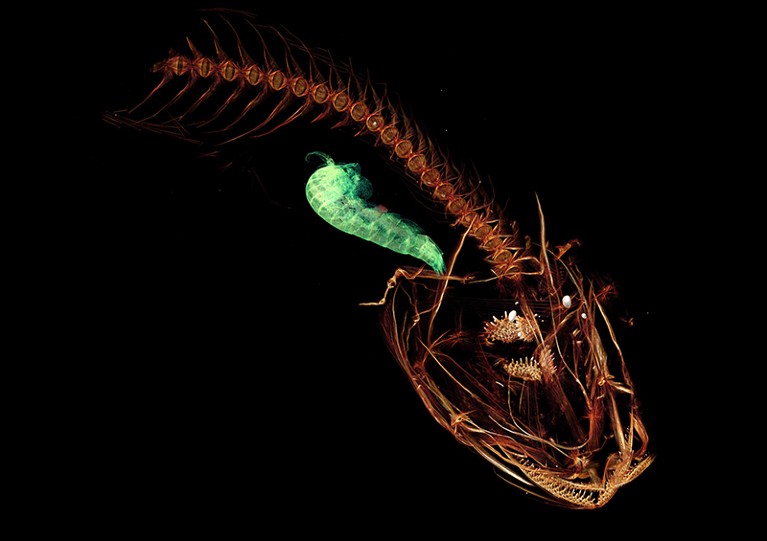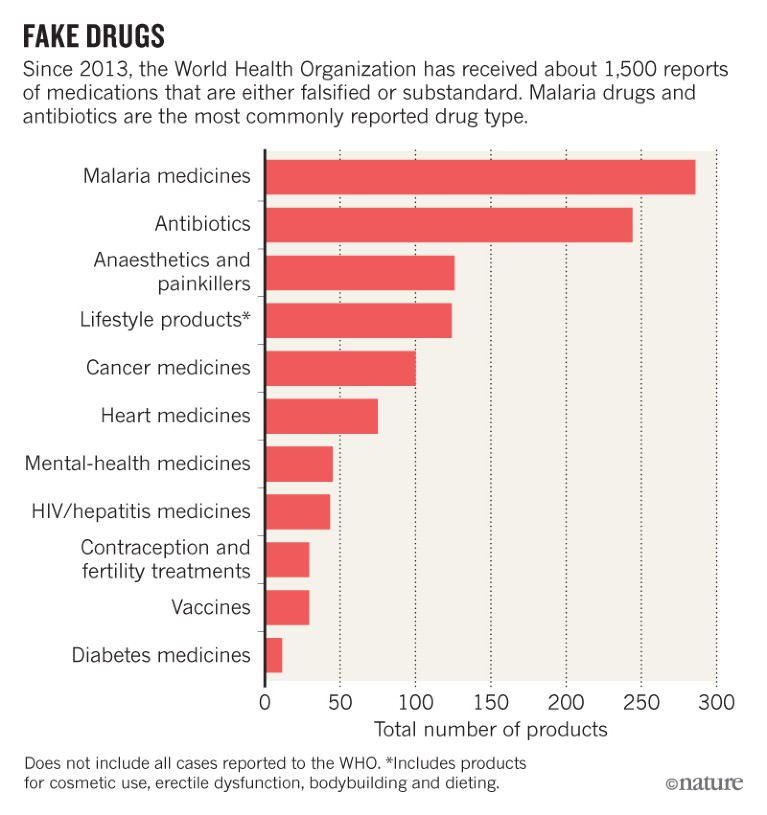RESEARCH
New species spotted in deep-sea trench Nearly 8 kilometres down in the Pacific Ocean’s Mariana Trench, researchers have documented a translucent, pale-pink snailfish. In a report published on 28 November, this deep-sea dweller received a formal scientific name, Pseudoliparis swirei (M. E. Gerringer et al. Zootaxa 4358, 161–177; 2017). The new species description is based on 37 individuals that seem to subsist on a diet of tiny crustaceans (pictured in green is a crustacean in the snailfish’s stomach). Although many deep-sea fish species are bioluminescent — producing light with the help of resident bacteria that glow — P. swirei lacks this ability. It is one of only two species of snailfish recorded at such depths; the other species has been filmed but never caught.

A CT scan of the Mariana snailfish (Pseudoliparis swirei).Credit: Adam Summers/Univ. Washington
Dengue vaccine The world’s only dengue-fever vaccine protects people who have had dengue previously, but could endanger those who have not, a retrospective analysis has found. The vaccine puts the latter group at higher risk of developing a severe, potentially fatal version of the mosquito-borne disease if they are later infected. The vaccine’s maker, Sanofi in Paris, reported the finding — which is based on six years of data — on 29 November, and suggested that authorities update their guidelines accordingly. The disease’s complicated pathology might provide clues about why the vaccine has caused problems. The biggest risk for contracting a life-threatening case of dengue fever is previous infection by a different strain of the virus.
POLICY
Chinese medicines The China Food and Drug Administration has ordered companies to stop using ambiguous, non-scientific, exaggerated or superstitious names for traditional Chinese medicines (TCMs). Instead, the agency encourages names based on literary or cultural references that, by analogy, help to explain the medicine’s use. The aim of the policy, announced on 28 November, is to have terms that are scientific and reflect Chinese culture. An example of proper naming would be Yu Ping Feng San, which means ‘jade shield’ and is claimed to shield users from allergies and respiratory-tract infections. The agency will soon publish a list of commercialized TCMs that are in violation of the naming guidelines. Companies will have two years to transition to the new names.
Singapore research Singapore plans to invest 82.5 million Singaporean dollars (US$61 million) over five years in research on urban food production, antimicrobial drug resistance and cybersecurity, the government announced on 1 December. Two projects, one monitoring crops using nanosensors to help maximize yields and another developing new diagnostics for drug-resistant microbes, will start in January 2018. A programme to make the connection between digital services and physical components more secure started in September. The projects will be managed by the city-state’s Campus for Research Excellence and Technological Enterprise (CREATE), which was set up ten years ago to foster collaboration between local and international institutions.
Arctic fishing ban Eight major fishing nations and the European Union agreed on 30 November to ban commercial fishing in a 2.8-million-square-kilometre region of the Arctic Ocean for at least 16 years. Signatories to the legally binding deal, which include the United States, Canada, Russia and China, also agreed to establish a joint research programme on the marine ecology of the rapidly warming region. Commercial fishing in the high seas of the Arctic Ocean has not yet taken place because sea ice has made it inaccessible to fishing vessels. But large-scale fisheries might become viable because large parts of the ocean are expected to become ice-free during the summer within a few decades.
EVENTS
Robot explorers A research consortium is developing tiny robotic airships to explore hard-to-reach spaces inside historic buildings while causing minimal damage, according to plans outlined on 28 November. The idea was sparked by the discovery, published last month, of a mysterious, 30-metre-long void inside the Great Pyramid in Giza, Egypt (K. Morishima et al. Nature http://doi.org/cftw; 2017). French scientists will collaborate with engineers at Cairo University to develop two types of camera-wielding explorer that can squeeze through a hole less than 3.5 centimetres wide: a tubular robot and a miniature airship. The researchers say that the airship is intended to inflate to a diameter of 80 centimetres once in the target space, and that it would pose less of a risk to artefacts or monuments than a conventional drone if it crashed.

Great Pyramid in Giza.Credit: DeAgostini/Getty
Student protests On 29 November, graduate students at dozens of US universities demonstrated against a proposal to begin taxing their tuition waivers as income. A sweeping tax-reform bill approved by the US House of Representatives on 16 November contains the provision, although a companion bill approved by the US Senate on 1 December does not. The two chambers must now reconcile their proposals before seeking final approval from US President Donald Trump. Many graduate students who have tuition fees waived in exchange for teaching or research say that the House provision would effectively double their taxable income, causing their federal income-tax bills to balloon.
ENVIRONMENT
Protected lands On 4 December, US President Donald Trump slashed the Bears Ears National Monument in Utah from 547,000 hectares to 82,000, and split the remaining land into two areas. The decision removes protections for thousands of Native American archaeological sites, some up to 13,000 years old. It also creates a legal quagmire. Although presidents have clear authority to create monuments, many legal scholars argue that only the US Congress can change the areas’ boundaries. On 4 December, five Native American tribes sued the government over the Bears Ears cuts.
PEOPLE
Fraud charges Psychiatry researcher Alexander Neumeister has been charged with criminal and civil misuse of federal grant money while he was employed at New York University (NYU). On 28 November, the acting US attorney for the southern district of New York announced allegations that Neumeister had fraudulently used tens of thousands of dollars from research grants for personal expenses, including trips and gifts for a friend who he falsely claimed was a study participant. Neumeister was arrested on fraud charges on 21 November. In 2015, NYU interviewed Neumeister after a university audit of financial purchases associated with grants on which he was the principal investigator. Neumeister admitted to making some of those purchases but not others. He resigned from NYU about a month later. Neumeister’s lawyers did not respond to a request for comment.
AWARDS
John Maddox prize Physician Riko Muranaka has won this year’s John Maddox Prize for people who champion sound science and evidence in the face of hostility. Muranaka, a lecturer at Kyoto University in Japan, was recognized for promoting the use of evidence in public discussions about the human papilloma virus (HPV) vaccine. The vaccine, which helps to prevent cervical cancer, is recognized as safe by the scientific community. But a misinformation campaign in Japan has led to vaccination rates there falling from 70% to less than 1%. Muranaka’s work has continued in the face of attempts to silence her with litigation. The John Maddox Prize — named after the late former editor of Nature — is sponsored by Nature and the London-based charities the Kohn Foundation and Sense About Science.
Mentoring honours The winners of the 2017 Nature Awards for Scientific Mentoring — which honoured outstanding scientific mentors in Spain — were announced on 4 December. Lifetime-achievement prizes were awarded to Margarita Salas at the Spanish National Research Council’s Severo Ochoa Centre for Molecular Biology in Madrid and Carlos Belmonte of the Institute of Neuroscience at Miguel Hernández University in Alicante. Lluís Torner at the Institute for Photonic Sciences in Barcelona and molecular biologist Carlos López-Otín at the University of Oviedo received mid-career awards. Carmen Vela, Spain’s state secretary for investigation, development and innovation, presented the prizes in Madrid.
TREND WATCH
One in ten medical products in developing countries is fake or substandard, the World Health Organization (WHO) suggests. Since 2013, the agency has received about 1,500 reports of fraudulent or inferior products from low- and middle-income countries: 42% in Africa, 21% in the Americas and 21% in Europe. The cases include drugs that are fraudulent, fail to meet standards, or which have not been authorized for market. The data were published in two WHO reports on 28 November.

Source: WHO





